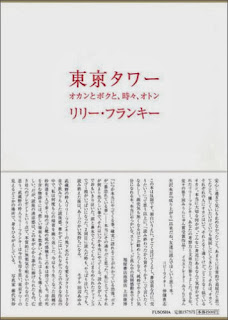The story of book's unfolds from a young man's recollections of his wild painter father and his hard working mother. His earliest memories are when his mother got fed up with the father's drunken antics and brought him back to her small mining home town to live. Growing up in a fading mining town with summer visits to his father he decides to become an artist like his father. With a little training from his father and unquestioning love and support from his mother he makes it into a regional high school known for its art program. Here he starts a wastrel student life that he continues through high school and even into college in Tokyo. All the while he is living off the hard earned money his mother keeps sending him.
As the story unfolds in retrospect, through the parallel current narration we learn that his mother is ill and in a hospital. The narration of the past arrives at the point of his having spent the money for going to his maternal grandmother's funeral on partying when he didn't even have rent money. Finding himself with his few posessions out on the street he meets up with a fellow art school student who has graduated but also not yet able to support himself. They team up and eventually are able to sell some illustrations and get off the street.
While his career is starting his mother's health has been failing. She recovers from a bout of throat cancer but with unfirm health she has lost her little restaurant and can't even keep a job at another restaurant because of days needed for rest or treatment.
In the initial current narrative we already have seen the narrator make a radio appearance where he made smutty jokes and was treated as a celebrity. We see through the recollection of the past that he went from illustrations and jokes for erotic magazines to writer of jokes and lines for AV starlets until he is offered a regular column of his own. Feeling successful for the first time and also seeing how his mother has been reduced to living off her sisters he invites her to come and live with him in Tokyo. After a little hesitation on both sides she accepts and moves with him into an apartment where she blossoms into a friendly funny mother figure who feeds and entertains all his friends.
The happiness doesn't last too long (although one of the characters later comments that the mother said she had a year of great fun and a life time worth of being taken care of by her son) before her cancer returns and the narrative of the past merges with the current events of her being in the hospital.
The narrator from the beginning said he would tell how his mother had ended up dying within view of the Tokyo Tower. One recurring image has been a photograph of his father in cowboy regalia standing in front of the still under construction Tokyo Tower. Once when the narrator was driving his car with his mother and his girl friend coming from an enjoyable night on the town, at a stop light they looked up at the tower lit up in the night and the mother commented on how she had never had gone up on the tower. The narrator's words to us have usually come to us as he sits at his mother's bedside looking out at the tower. He again looks out the window as he is beginning to realize that he is losing his mother to her illness. It was on a day when it surprisingly snows even after the cherry trees have blossomed.
As her condition has grown worse, his father, her estranged husband, arrives and there is a bitter sweet family reconciliation around her death bed. In one scene, even though the mother can scarcely speak or move she urges the father to turn on the radio so that they can hear their son's trade mark raunchy humor program. The son plays an old song on his program with a special but descrete dedication which triggers a fantasy sequence of the mother and father in their youth doing elegant ball room dancing. When the father finds out how much the son is spending to care for his mother he recognizes his son's financial success. Father and son are together in her hospital room when death comes.
The narrator is devastated by his mother's death but his memories of her encouragement keep him going and even help him meet an editorial dead line during her wake. All his friends have come to the wake and they are sad at her death but also recall the humor and love of life she had.
As a final sign that he is continuing his life with the strength from the love of his mother, he brings the wood marker with her death name up to the Tokyo Tower observation deck. There he meets his estranged girl friend and they fulfill his mother's desire that they all go up on Tokyo Tower together.
In the end, the future is uncertain, but we are encouraged to live life fully.



No comments:
Post a Comment